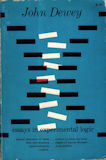The foundation of these papers on experimental logic is the theory that knowledge about anything implies a judgment, which in turn implies an inquiry or investigation of a sort. The presence of this “inquiry stage” implies that between the external world and knowledge there is an intermediate and mediating stage, which is in turn conditioned by other factors. Expanding upon this basis, these papers consider the relationship of thought and its subject matter, the antecedents and stimuli of thought, data and meanings, the objects of thought, control of ideas by facts and similar topics.
Three papers describe various kinds of philosophical realism, in which the thought of Bertrand Russell’s Our Knowledge of the External World as a Field For Scientific Method is closely examined, while two other papers discuss Pragmatism, differentiating Dewey’s position from that of James and Peirce. These essays present what is probably Dewey’s most easily followed account of his own thought. The section entitled “Stages of Logical Thought” analyzes the role of scientific method in philosophy, while the final essay presents a striking theory of a logic of values.

